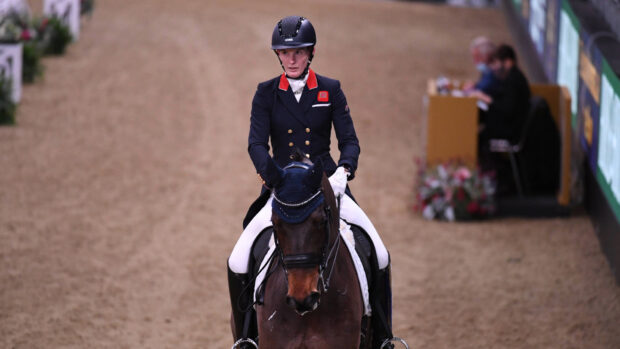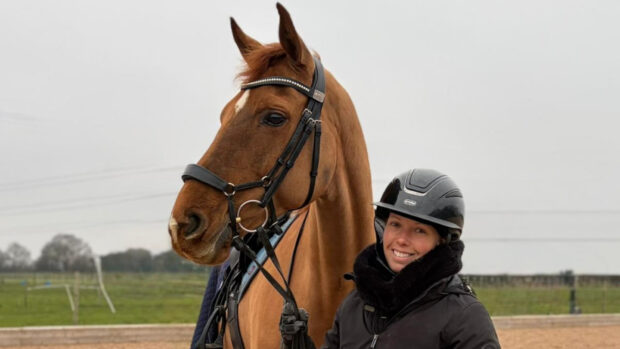*Update* This article was published in August 2022. The FEI suspension of Roberto Gottarelli to which the article refers ended on 8 March 2023.
A vet who gave a horse a banned substance has been suspended for two years from his FEI roles and fined thousands by the FEI Tribunal.
Roberto Gottarelli, national head vet of San Marino and a member of the Italian equestrian federation, injected jumper Halo with anabolic steroid stanozolol, the FEI Tribunal heard. The mare failed a dope test in Spain (29 September–4 October 2020), where she was competing with Italian rider Giuseppe de Luca.
A letter from Mr Gottarelli said the treatment was for “a fragility” of the cartilage in Halo’s left hock.
“To physiologically stimulate the activity of cartilage cells, I proposed to Mr de Luca the utilisation of Sungate – stanozolol by means of intra-articular injection – three times a week, for a total of four injections,” he wrote. “I specified to the client that this medicine, if administered [this way], normally would not have put him at any risk profile relating to the [anti-doping] list drafted by FEI, on the basis of both the known scientific literature and my professional experience on dozens of cases.”
He said the last injection was on 21 September 2020, that the use of the drug “falls within a precise therapeutic plan”, and that Sungate is authorised by the Italian ministry of health.
The rider was also brought to the FEI Tribunal and said he had seen stanozolol was not allowed, so checked with Mr Gottarelli.
Mr de Luca said he was “assured” by Mr Gottarelli that the way Sungate was to be used was allowed under FEI rules, if the correct detection time was used.
The tribunal found Mr de Luca at fault. His ban was reduced by six months owing to tweaks in the rules, his honesty, cooperation and swift admittal of the rule violation. He served 18 months and was fined CHF5,000 (£4,300).
Mr Gottarelli said his right to a fair trial had been violated as he had written the letter at Mr de Luca’s request to prove the rider had no fault for the positive test.
“[Mr Gottarelli] issued a statement with the best of intentions, unaware that the [rider] was intending to shift the blame […] thereby causing [the vet] to move from a position of a helpful witness to an accused party,” states the Tribunal report.
The vet argued that the FEI was “trying to fix loopholes in its own rules” by maintaining that any horse registered is considered a competition horse, and pointed to his “impeccable reputation” and “commitment to horse welfare.
He said he did not consider Halo a “competition horse” at the time of treatment, as he knew the mare had not competed for almost a year, so “could not have been expected to believe” she was competing, or would be “any time soon”. The FEI said he was Halo’s regular vet, and that she competed eight days after her final injection.
He said he was acting “in the best interest of the horse, and had chosen the most effective treatment under these circumstances” and was not treating to enhance performance.
Zero tolerance
The FEI highlighted its “zero-tolerance” stance on stanozolol, “one of the most-known abusive anabolic steroids in the industry”.
It also argued that given the “various official” vet roles Mr Gottarelli held, he “ought to have been aware of the rules”.
“The FEI believed that [Mr Gottarelli] clearly knew and suspected that he had treated the horse with a banned substance,” states the Tribunal report.
“The FEI stated that they were very curious why [the vet] chose to use Sungate. There were alternative allowed treatments, which may have been equally efficient but with a bit longer rest and recovery time. As such, the FEI queries whether it was logical there was no intent to enhance performance and strongly disagreed [as] the prospect of returning a horse to its normal condition with prohibited substances could only be deemed as trying to enhance performance.”
Mr Gottarelli was given a two-year ineligibility order for his FEI roles, a fine of CHF5,000 and ordered to pay CHF2,000 costs by the FEI Tribunal.
You might also be interested in:

Subscribe to Horse & Hound magazine today – and enjoy unlimited website access all year round
Horse & Hound magazine, out every Thursday, is packed with all the latest news and reports, as well as interviews, specials, nostalgia, vet and training advice. Find how you can enjoy the magazine delivered to your door every week, plus options to upgrade your subscription to access our online service that brings you breaking news and reports as well as other benefits.




